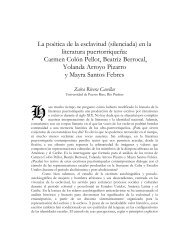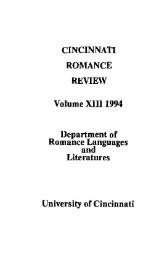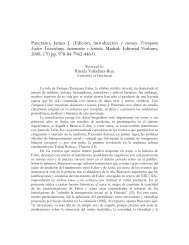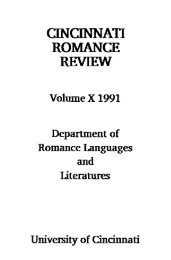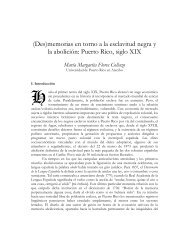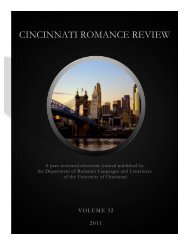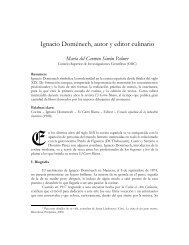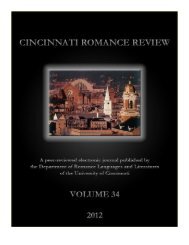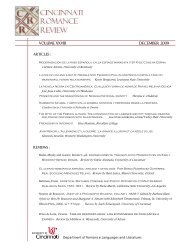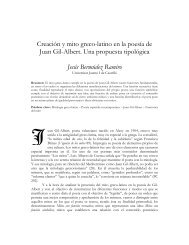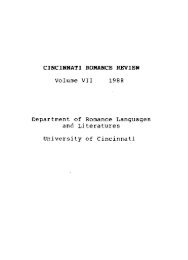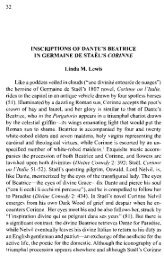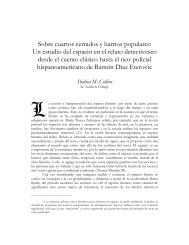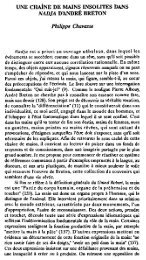Volume 30 (2011) - Cincinnati Romance Review
Volume 30 (2011) - Cincinnati Romance Review
Volume 30 (2011) - Cincinnati Romance Review
Create successful ePaper yourself
Turn your PDF publications into a flip-book with our unique Google optimized e-Paper software.
“THE EROTIC AS POWER” 93<br />
Rican woman exposes the discord in the presumed racial harmony in the “la Gran<br />
Familia Puertorriqueña” (the Great Puerto Rican Family), the discursive metaphor of<br />
racial mixture and solidarity. 3 Marina’s use of the erotic as power reveals a history that<br />
has worked to invisibilize and suppress the subjectivity of Afro-descendant women.<br />
Marina grows up in Carolina around “El Pinchimoja,” a local restaurant<br />
operated by her father, Esteban París and his common-law wife, Edovina Vera. Marina<br />
takes over responsibility for the kitchen, supervising the preparation of the meals while<br />
her perpetually pregnant mother tends to the growing family. From the age of eight to<br />
thirteen, Marina begins to display her ability to give off the sweet, salty, and spicy smells<br />
of the kitchen from her body. She attracts the attention of the local men, drawn to her<br />
and “El Pinchimoja” because of her developing adolescent body and her ability to<br />
produce familiar aromas. Marina is unaware, however, that the fragrances released by<br />
her body arouse desires in men – including her own father:<br />
Y ella, arropada como siempre en sus olores, ni se dio cuenta de que con<br />
ellos embrujaba a todo el que le pasaba cerca. Su sonrisa ampulosa, sus<br />
pasas recogidas en trenzas y pañuelos, sus pómulos altos y el olor del día<br />
le sacaban la alegría hasta el picador de caña mas decrépito, hasta al<br />
trabajador de caminos más chupado por el sol, hasta su padre,<br />
clarinetista frustrado, quien se levantaba de su sopor de alcohol y sueños<br />
e iba a parársele cerca de su Marina nada más para olerla pasar. (Santos-<br />
Febres 40)<br />
The effect that Marina begins to have on men, particularly her father, causes<br />
great concern for Edovina who realizes that thirteen is a “dangerous age.” Without<br />
warning, Edovina arranges for Marina to leave the house and the restaurant and for her<br />
to begin to work for the Velázquez, a local white family. The Velazquez family includes<br />
the matriarch, doña Georgina, described as a “blanca beata ricachona” with a wellknown<br />
taste for “yuca guisada con camarones” and her nineteen-year-old son Hipólito<br />
who also has a well-known penchant for dark-skinned girls, has set his desires on<br />
Marina. Carmen M. Rivera Villegas observes the great irony of the proud whiteness of<br />
the Velazquez family and their preference for African-derived gastronomy and Africandescended<br />
bodies, a not-so-subtle commentary on the difficult acknowledgement of<br />
blackness that unravels the myth of whiteness and purity among the island’s upper<br />
middle class (“La celebración de la identidad”).<br />
While Marina is in the Velázquez household, business at the Pinchimoja tapers<br />
off and she discovers the sensual and erotic capabilities of her body, “Fue en la casa de<br />
los Velázquez donde Marina se percató de su habilidad podigiosa para albergar olores en<br />
______________________<br />
3 See “La Gran Familia Puertorriqueña Ej Prieta De Verdad” by Arlene Torres.<br />
<strong>Cincinnati</strong> <strong>Romance</strong> <strong>Review</strong> <strong>30</strong> (Winter <strong>2011</strong>): 83-98.



